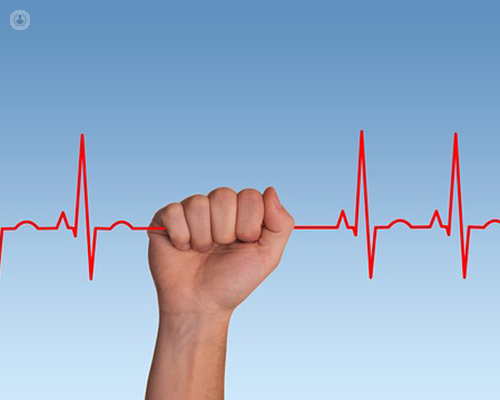My heart has an extra beat - is it serious? All you need to know about ventricular ectopic beats
Escrito por:The occasional feeling of butterflies in the chest can be a disturbing experience for some people. Generally when the heart skips, or has an extra beat, it’s not usually dangerous. Expert cardiologist Dr Syed Ahsan discusses ventricular ectopic beats (extra heartbeats), a condition which may happen more frequently in certain people, and exactly when you should see a specialist.

What are ventricular ectopic beats?
Almost all of us will have ventricular ectopic beats, which are extra heartbeats that originate in the bottom chambers of the heart (the ventricles).
A normal heartbeat occurs from the top of the heart (the atria). The ventricular ectopic beats occur prematurely, which causes the heart to beat in a different way for that beat.
Is ventricular ectopic beat serious?
In the majority of patients who have a structurally normal heart, extra heartbeats are almost always benign and don’t require treatment unless they cause other symptoms. In a smaller group of people who have evidence of structural heart disease, ventricular ectopics can be a marker of increased risks.
What are the symptoms of ectopic beats?
Many patients do not have any symptoms. Others may experience:
- Fluttering or butterflies in the chest
- The sensation of the heart stopping
- Feeling like the heart has skipped a beat – proceeded by a short pause
- Dizziness
- A ‘thump’ in the chest
- Shortness of breath
These symptoms of an extra heartbeat are often experienced at night or when resting because the heart rate is lower at rest and asleep, allowing the ectopic beats more time to occur. Many people experience these conditions sporadically or with no particular triggers. Some experience these symptoms intermittently, with weeks or months between.
What are the causes of ectopic beats?
The commonest causes of extra heartbeats include:
- Caffeine – in coffee and energy drinks
- Alcohol
- Overly tired or disturbed sleep
- Hormonal changes – seen in pregnancy or menopause
- Occasionally, viral infections
Will I need further investigation for the cause of extra heartbeats?
The cardiologist will take a detailed history and examination to establish if there is a potential underlying cause, such as lifestyle factors or a family history of heart disease.
Patients will have an electrocardiogram (ECG) to provide a general overview of the heart. If the patient experiences frequent ectopic beats, an echocardiogram (heart ultrasound) or cardiac MRI scan may be performed to confirm that the heart has a normal structure and function. It also rules out heart muscle disease (cardiomyopathy).
Blood tests are also performed to look for other causes such as abnormal electrolyte levels, such as sodium and potassium, and thyroid function.
A continuous ECG monitor also establishes the ‘ectopic burden’, which measures the percentage of ectopic beats when compared to all your heartbeats. It helps to determine if the ectopic beats are originating from one site or from multiple sites, which guides treatment.
How are ventricular ectopic beats treated?
The condition is likely to be benign in many patients. Simple lifestyle measures such as reducing caffeine and alcohol intake, smoking less or quitting overall, improving sleeping habits and reducing stress is sufficient to improve or eliminate symptoms.
Medications – these are used to suppress the ectopics and improve symptoms.
Catheter ablation – if the ectopic beats originate from one site, then this treatment is used. It involves passing fine wires into the heart from the top of the leg in a minimally invasive procedure. A virtual 3D geometry of the heart is created using a computer mapping system. Electrical signals from within the heart are sent to the exact site of origin of the ectopic beats and high frequency energy is delivered at this site to eliminate the abnormal beats. This procedure is very safe and carries a very high success rate of over 85%. The risks are small and are in the region of 1-2%.
If you are worried about your heart rate or are experiencing irregular beats, book an appointment with a specialist.


